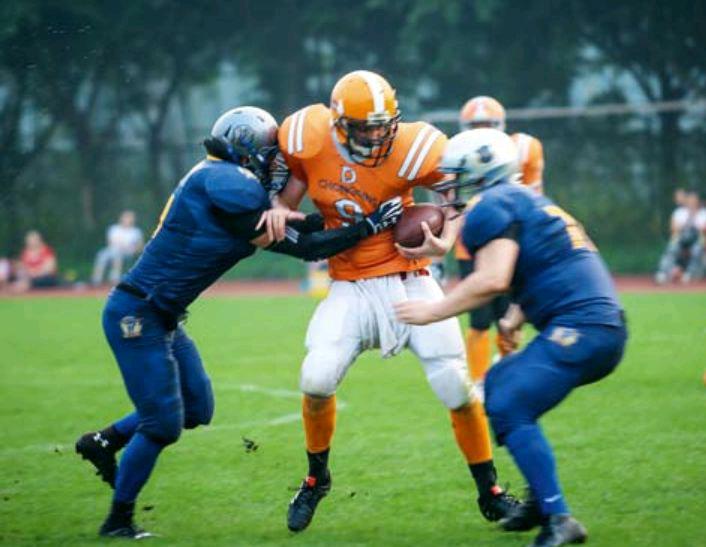An Even Longer Yard
2014-09-11byZoeZhao
by+Zoe+Zhao

In April 2014, Zeng Xi, representing the Chongqing-based American football team the Dockers, was featured on the cover of The New Republic, a liberal-leaning American magazine of commentary on politics and arts published continuously since 1914. Established in the summer of 2012, the Dockers participated in the 2013-2014 season of American Football League of China (AFLC) matches. Among eight competing amateur teams, the Dockers have the shortest history. But surprisingly, they became the first AFLC national champion. This Hollywood story even appealed to Sony Pictures, which acquired the rights to turn it into a major motion picture.
Since modern times, plenty of imported sports have taken root in China, such as soccer and basketball. However, American football is far from among them. In 2007, the National Football League (NFL) set up its first office in the country and established a flag football league. However, in this fast-developing country, anything is possible. The flag football league has now grown to more than 36 teams and a handful of amateur full-contact clubs have emerged, including the Chongqing Dockers. From six beginners to more than 40 players today, the Dockers men are mostly locals, including civil servants, policemen, teachers, retired military personnel, private business owners, and gym coaches. Several expats living in Chongqing also joined.
The Dockers started when Liu Yuanfeng, a 19-year-old freshman at the Chongqing Electronic Engineering University, created an American football QQ group. QQ is a popular Chinese online chat program. The group was named “Rudy,”after the 1993 film. The movie follows the life of Daniel “Rudy” Ruettiger, who dreamed of playing football at the University of Notre Dame despite significant ob- stacles. Xu Yang, the Dockers first captain, saw the information online and contacted Liu. Along with several others, soon they organized a practice, which scored them a full-length report in a local newspaper. After the practice, Xu received inquiries from more than 200 people. Not surprisingly, more than 30 people turned up at the training field the next time.
However, as expected, they showed up to learn to play football, not to play it. Actually, to this day, one of the major responsibilities of the Dockers coach is teaching new guys, starting with the most basic skills. It is fair to say that before head coach Chris McLaurin joined them in 2012, the team had almost nothing solid and real. The 26-year-old American once played tight end at the University of Michigan and could have possibly made the NFL if not for a major shoulder injury. The semi-pro player not only taught the skills of football, such as throwing, receiv- ing, and tackling, but more importantly, he brought team spirit, the core of football, to the players.
In early 2014, McLaurin returned to the United States and Eric Hall took over. Before coming to China, Hall was active in the American intercollegiate football. Contrasting McLaurin who placed emphasis on strategy, Hall pays more attention to basic skills, which is what every Docker and other football player in China needs to improve. But like his predecessor, Hall always tells his players that “team is above everything. Football relies on teamwork and cooperation much more than any other sport.”
Most Dockers didnt know anything about playing the game when joining. Several factors may contribute to footballs lack of popularity in China. First of all, the “violent” game is not found in any school curricula for kids. Fear of injury and physical contact scares away many from the sport. Hall hints that physique isnt a problem for Chinese; the Dockers are huge guys. But many just arent willing to use their size to its full ability. Second, many equate football to violence and aggressiveness, while in traditional Chinese culture, an ideal male should be gentle, smart and slim. Last but not least, playing costs money. The “entry fee” for football in China reaches around 3,000 yuan, mostly for equipment, which is nearly what an average Chongqing resident earns in a month.
Even so, Eric Hall believes that some of his players were “born for football,” such as Xie Tongyu, the current team captain who was born in 1991. The expats consider Xie a“tough player who possesses natural passion for the game akin to many American players.” Due to his outstanding ability, Xie plays both offense and defense. “The reason we practice in any weather at any time is to make our athletes stronger and tougher,”explains Hall. “Because Xie served in the army and received military training, he knows better how to employ such toughness within the confines of rules.”
Presently, the Dockers are practicing hard in order to defend their title in the coming season. At the same time, many players reveal that they hope for more friendly matches, which provide greater opportunities for Chinese to closely observe the game, clear up misunderstandings, and participate.
China Pictorial (CP): Since American football isnt very popular in China, how do you think your players feel about the game and what is their motivation for participating?
Eric Hall (Hall): The popularity of American football in China is increasing at a rapid pace. Teams are popping up all over China faster than they can find experienced coaches to teach them the game. Each player has his own personal motiva- tions ranging from curiosity and interest, to a strong desire to play the game well and to learn the skills and lessons that football teaches. Fascination for the sport may draw new players, but I think it is the supportive team atmosphere that keeps them. We work hard, learn, and grow together, and that is a fun experience.
CP: What is the worst injury youve seen a player sustain? Generally speaking, compared to Americans, Chinese are more afraid of getting injured in sports. Do you have to do something to help players conquer this common fear?
Hall: Confidence comes with knowledge and experience. The more time people spend playing this game, the more comfortable they will become, and the more they will understand correct (injury-preventing) techniques. Id say the worst injuries from football are probably concussions, but I havent heard of any concussions in China yet, and hopefully we coaches can teach players in a way that prevents this type of injury from ever happening. So far, I have seen many bruises and sore muscles, but I dont think I have witnessed any serious injuries yet.
CP: How is your quarterback at throwing? Is your strategy based primarily on running the ball?
Hall: Every offense has its own balance of running and passing based on its personnel. Throughout the 2013 season, our offense gradually increased the percentage of passing plays. We have used several different quarterbacks, all with different skill sets.
CP: What rules are most difficult for Chinese players to understand?
Hall: The most important rules to teach early on usually involve blocking: where to block, when to block, and how to block correctly.
CP: What is the most important quality you expect from your players?
Hall: We focus a lot of time on teamwork, discipline, commitment, and communication.
CP: Have you ever seen a Chinese player with the potential to play at an American university?
Hall: Yes, we have great potential on our team and on opposing teams around China. The biggest difference between Chinese and American players is experience. With time and the development of the AFLC and other leagues, football can become as competitive here as it is anywhere else.